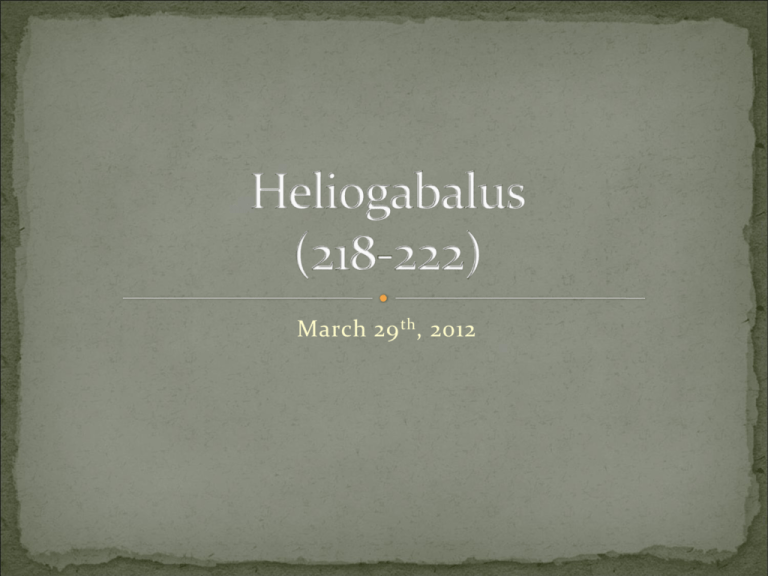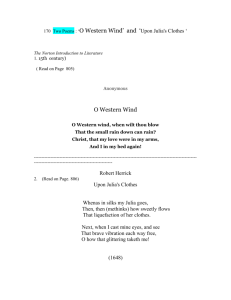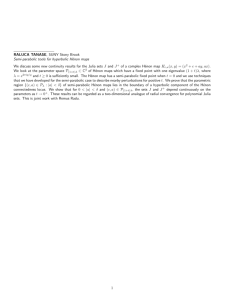Heliogabalus
advertisement

March 29 th , 2012 Considerable general agreement between Dio, Herodian, and the HA, 1-18 (remainder are bogus). Became immediately unpopular upon assuming the throne. Much about Heliogabalus offended Roman culture and social values. Why did many in Rome find Heliogabalus so offensive according to the HA? Reasons for Heliogabalus’ Unpopularity Religious program caused offence. Sexual orientation caused offence. Promotion of lowborn officials caused offence. Treatment of Alexianus caused offence. Julia Maesa the real power. B. 203 as Varius Avitus Bassianus; son of Julia Soaemias; grand-nephew of Julia Domna; priest of Elagabal (Syrian sun god). May 218 – Rallying point for Syrian legions seeking to oust Macrinus. June 218 – Macrinus dead; Heliogabalus emperor. June-Dec. 218 – Hunting down any supporters of Macrinus. Summer 219 – Heliogabalus in Rome; marriage to Cornelia Paula; temple to Elgabalus constructed at Rome. 220 – “Marriage of the Gods” (Vestal Virgin – Aquilia Severa to marry Heliogabalus). 221 – Army revolt; adoption of Alexianus (as Alexander). 222 – Power struggle between Heliogabulus (Julia Soaemias) and Alexianus (Julia Maesa, Julia Mammaea); attempts to isolate and murder Alexianus; confrontation in Praetorian camp; Heliogabalus and Julia Soaemias killed. Promoted worship of Elagabal as supreme deity above traditional Roman gods and goddess. Rituals of Elagabal caused great consternation in Rome. Acts of sacrilege committed against venerated Roman religious traditions. “As soon as he entered the city, however, neglecting all the affairs of the provinces, he established Elagabalus as a god on the Palatine Hill close to the imperial palace; and he built him a temple, to which he desired to transfer the emblem of the Great Mother, the fire of Vesta, the Palladium, the shields of the Salii, and all that the Romans held sacred, purposing that no god might be worshipped at Rome save only Elagabalus. 5 He declared, furthermore, that the religions of the Jews and the Samaritans and the rites of the Christians must also be transferred to this place, in order that the priesthood of Elagabalus might include the mysteries of every form of worship.” (HA, Heliogabalus 3.45. Trans. D. Magie, 1924). “Closely related to these irregularities was his conduct in the matter of Elagabalus. The offence consisted, not in his introducing a foreign god into Rome or in his exalting him in very strange ways, but in his placing him even before Jupiter himself and causing himself to be voted his priest, also in his circumcising himself and abstaining from swine's flesh, on the ground that his devotion would thereby be purer. He had planned, indeed, to cut off his genitals altogether, but that desire was prompted solely by his effeminacy; the circumcision which he actually carried out was a part of the priestly requirements of Elagabalus, and he accordingly mutilated many of his companions in like manner. 2 Furthermore, he was frequently seen even in public clad in the barbaric dress which the Syrian priests use, and this had as much to do as anything with his receiving the nickname of "The Assyrian." (Dio 80, 11. E. Cary, 1927) http://www.livius.org/a/italy/rome/t_heliogabalus/t_elagabal.JPG “Heliogabalus then made the distribution of money customary at the succession of an emperor and staged lavish and extravagant spectacles of every kind. He erected a huge and magnificent temple to his god and surrounded it with numerous altars. Coming forth early each morning, he sacrificed there hecatombs of bulls and a vast number of sheep. These he placed upon the altars and heaped up spices of every kind; he also set before the altars many jars of the oldest and finest wines, so that the streams of blood mingled with streams of wine. Heliogabalus danced around the altars to music played on every kind of instrument; women from his own country accompanied him in these dances, carrying cymbals and drums as they circled the altars. The entire senate and all the knights stood watching, like spectators at the theater.” (Herodian, 5.5.8-9. Trans. E.C. Echols, 1961) “He violated the chastity of a Vestal Virgin, and by removing the holy shrines he profaned the sacred rites of the Roman nation. 7 He also desired to extinguish the everlasting fire. In fact, it was his desire to abolish not only the religious ceremonies of the Romans but also those of the whole world, his one wish being that the god Elagabalus should be worshipped everywhere. He even broke into the sanctuary of Vesta, into which only Vestal Virgins and the priests may enter, though himself defiled by every moral stain and in the company of those who had defiled themselves. 8 He also attempted to carry away the sacred shrine, but instead of the true one he seized only an earthenware one, which the Senior Vestal had shown him in an attempt to deceive him, and when he found nothing in it, he threw it down and broke it. The cult, however, did not suffer at his hands, for several shrines had been made, it is said, exactly like the true one, in order that none might ever be able to take this one away. 9 Though this be so, he nevertheless carried away the image which he believed to be the Palladium, and after washing it over with gold he placed it in the temple of his god.” (HA, Heliogabalus 6.6-9. Trans. D. Magie, 1924). “Afterwards he divorced Paula on the ground that she had some blemish on her body, and cohabited with Aquilia Severa, thereby most flagrantly violating the law; for she was consecrated to Vesta, and yet he most impiously defiled her. Indeed, he had the boldness to say: I did it in order that godlike children might spring from me, the high priest, and from her, the high-priestess." 4 Thus he plumed himself over an act for which he ought to have been scourged in the Forum, thrown into prison, and then put to death. However, he did not keep even this woman long, but married a second, a third, a fourth, and still another; after that he returned to Severa.” (Dio 80, 9.3-4. E. Cary, 1927) “I will not describe the barbaric chants which Sardanapalus, together with his mother and grandmother, chanted to Elagabalus, or the secret sacrifices that he offered to him, slaying boys and using charms, in fact actually shutting up alive in the god's temple a lion, a monkey, and a snake, and throwing in among them human genitals, and practising other unholy rites, while he invariably wore innumerable amulets.” (Dio 80, 11. E. Cary, 1927). “Elagabalus also sacrificed human victims, and for this purpose he collected from the whole of Italy children of noble birth and beautiful appearance, whose fathers and mothers were alive, intending, I suppose, that the sorrow, if suffered by two parents, should be all the greater. 2 Finally, he kept about him every kind of magician and had them perform daily sacrifices, himself urging them on and giving thanks to the gods because he found them to be welldisposed to these men; and all the while he would examine the children's vitals and torture the victims after the manner of his own native rites.” (HA, Heliogabalus 8. Trans. D. Magie, 1924). Severely deprecated for his “effeminate” demeanor. Transvestitism; rumors of an attempted “sex change.” More interested in sexual escapades than in governing. Offended Roman values (especially in the army). “He made a public bath in the imperial palace and at the same time threw open the bath of Plautinus to the populace, that by this means he might get a supply of men with unusually large organs. 7 He also took care to have the whole city and the wharves searched for onobeli, as those were called who seemed particularly lusty.” (HA, Heliogabalus 8.6. Trans. D. Magie, 1924). “As prefect of the guard he appointed a dancer who had been on the stage at Rome, as prefect of the watch a chariotdriver named Cordius, and as prefect of the grain-supply a barber named Claudius, 2 and to the other posts of distinction he advanced men whose sole recommendation was the enormous size of their privates. As collector of the five-percent tax on inheritances he appointed a mule-driver, a courier, a cook, and a locksmith. 3 When he went to the Camp or the Senate-house he took with him his grandmother, Varia by name, whom I have previously mentioned, in order that through her prestige he might get greater respect — for by himself he got none. And never before his time, as I have already said, did a woman come into the Senate-chamber or receive an invitation to take part in the drafting of a decree and express her opinion in the debate. 4 At his banquets he preferred to have perverts placed next to him and took special delight in touching or fondling them, and whenever he drank one of them was usually selected to hand him the cup.” (HA, Heliogabalus 12. Trans. D. Magie, 1924). “And finally,— to go back now to the story which I began,— he was bestowed in marriage and was termed wife, mistress, and queen. He worked with wool, sometimes wore a hair-net, and painted his eyes, daubing them with white lead and alkanet. Once, indeed, he shaved his chin and held a festival to mark the event; but after that he had the hairs plucked out, so as to look more like a woman. And he often reclined while receiving the salutations of the senators.15 The husband of this "woman" was Hierocles, a Carian slave, once the favourite of Gordius, from whom he had learned to drive a chariot.” (Dio 80, 14.4-15.1 E. Cary, 1927). “He carried his lewdness to such a point that he asked the physicians to contrive a woman's vagina in his body by means of an incision, promising them large sums for doing so.” (Dio 80, 16.7 E. Cary, 1927). Caution? ““Is it not deplorable that a faction...of abandoned, hopeless outlaws makes attacks against the gods? They together ignorant persons from the lowest dregs, and credulous women, easily deceived as their sex is, and organize a rabble of unholy conspirators, leagued together in nocturnal associations and by ritual feasts and barbarous foods, not for the purpose of some sacred rite, but for the sake of sacrilege – a secret tribe that shuns the light, silent in public but talkative in secret places. They despise the temples as if they were tombs, they spit upon the gods, they ridicule our sacred rites...On an appointed day they assemble at a feast with all their children, sisters, and mothers, people of both sexes and every age. There, after much feasting, when the banquet has become heated and intoxication has inflamed the drunken passions of incestuous lust, a dog which has been tied to a lamp is incited to rush and leap forward after a morsel thrown beyond the range of the cord by which it was tied. The telltale light is upset and extinguished, and in the shameless dark they exchange embraces indiscriminately, and all, if not actually, yet by complicity, are equally involved in incest...Furthermore, they threaten the whole world and the universe itself and its stars with fire, and work for its destruction...Not content with this insane notion, they add to and weave old wives’ tales: they say that they are reborn after death from the cinders and the ashes, and with unaccountable confidence believe in one another’s lies.” (Minucius Felix 8.3.-12. Lewis & Reinhold, 1990. p. 553-5) Army unhappy over behavior Heliogabalus. The disapproval of Julia Maesa; actively working behind the scenes to promote Alexianus (son of Julia Mammaea). Army revolt forces emperor to adopt Alexianus; resents the insult; tries to have Alexianus killed. Protected by Julia Maesa. “As for the soldiers, they could not endure to have such a pest clothed with the name of emperor, and they all expressed their views, first one to another, then in groups, turning their thoughts to Alexander, who previously, at the time when Macrinus was murdered, had been hailed by the senate as Caesar — he was the cousin of this Antoninus, for both were grandsons of Varia, from whom Elagabalus had the name Varius.” (HA, Heliogabalus 10.1. Trans. D. Magie, 1924). “When, however, Sardanapalus attempted to destroy Alexander, he not only accomplished nothing but came near being killed himself. 2 For Alexander was sedulously guarded by his mother and his grandmother and by the soldiers, and the Pretorians, also, on becoming aware of the attempt of Sardanapalus, raised a terrible tumult; and they did not stop rioting until Sardanapalus, accompanied by Alexander, 3 came to the camp and poured out his supplications and under compulsion surrendered such of his companions in lewdness as the soldiers demanded. In behalf of Hierocles he offered piteous pleas and bewailed him with tears; then, pointing to his own throat, he cried: "Grant me this one man, whatever you may have been pleased to suspect about him, or else slay me." Thus with difficulty he succeeded in appeasing them; 4 and for the time being he was saved himself, though with difficulty. Even his grandmother hated him because of his deeds, which seemed to show that he was not the son of Antoninus at all, and was coming to favour Alexander, as being really sprung from him.” (Dio 80, 19.2-4 E. Cary, 1927). “Observing his actions, Maesa suspected that the soldiers were outraged by his eccentricities. Fearing that if Heliogabalus were killed, she would become a private citizen again, she tried to persuade the youth, who was in every respect an empty-headed young idiot, to adopt as his son and appoint as caesar his first cousin and her grandson, the child of her other daughter, Mamaea.” (Herodian, 5.7.1. Trans. E.C. Echols, 1961) Heliogabalus continually plotting the death of Alexianus; Alexianus kept away from Heliogabalus by Julia Mammaea; repeated plots detected in advance and foiled by Julia Maesa. Julia Mammaea distributing gold to the Praetorians. Heliogabalus attempts to strip Alexianus of imperial posts and title of Caesar. Praetorians demand to see Alexianus. Heliogabalus and Julia Soaemias accompany Alexianus to the Praetorian camp. Soldiers cheer Alexianus; ignore Heliogabalus; orders the arrest of some of the guardsmen. Praetorians kill Heliogabalus and Julia Soaemias; Alexianus proclaimed emperor Severus Alexander. “Considering the occasion ideal and the provocation just, they killed Heliogabalus and his mother Soaemias (for she was in the camp as Augusta and as his mother), together with all his attendants who were seized in the camp and who seemed to be his associates and companions in evil. They gave the bodies of Heliogabalus and Soaemias to those who wanted to drag them about and abuse them; when the bodies had been dragged throughout the city, the mutilated corpses were thrown into the public sewer which flows into the Tiber.” (Herodian, 5.8.8-9. Trans. E.C. Echols, 1961) Severus Alexander emperor in March 222 @ 12 years. Because of his youth completely dependent upon Julia Maesa and Julia Mammaea. Generally considered upright; tried to restore the prestige of the senate; restored the dignity of traditional Roman religious forms alongside new forms (i.e. Christianity). 227-233 – Alexander in the east fighting incursions from Sassanid Persia. Diversion of Roman resources to the eastern frontier encouraged incursions from Germanic tribes. 234 – Alexander at Moguntiacum (Mainz) to check the threat; negotiated a (purchased) peace; armies mutiny; Alexander and Julia Mammaea killed; last of the Severans. Rome degenerates into 50 years of intermittent civil war Emperors made by armies; do not last long Maximus the Thracian (235-8); Gordian I and II, Balbinus, Pupienus (238); Gordian III (238-44), Philip the Arab (24449); Decius (249-51); Gallus (251-53); Aemilianus (253); Valerian (253-60); Gallienus (253-68); Claudius II Gothicus (268-70); Quintillus (270); Aurelian (270-75); Tacitus (27576); Florianus (276); Probus (276-82); Carus (282-83); Numerianus (283-4); Carinus (283-5) Most did not die of natural causes Stability achieved under Diocletian (284-305); empire dramatically transformed; late antiquity. What are the difficulties faced by historians in reconstructing the actions and character of Heliogabalus? Why was Heliogabalus unsuccessful as an emperor? How does the reign of Heliogabalus accord with the remarks made by Marx in The Eighteenth Brumaire of Louis Bonaparte? How would you assess the role of the Severan women in the success or failure of the Severan dynasty?







